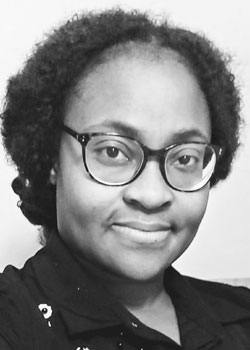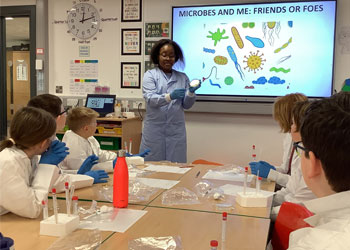International Day of Women and Girls in Science: Linda Boniface Oyama

Could you tell us about yourself?
I am Dr Linda Boniface Oyama. I’m a microbiologist, currently working as a Postdoctoral Research Fellow at Queen’s University Belfast. Here, I am applying the principles of the One Health Initiative, to study livestock gastrointestinal tract microbiomes, with a particular focus on understanding the evolution and dispersal of antimicrobial resistance (AMR) and prospecting the same microbiomes for novel antimicrobial compounds to tackle the AMR problem.
It’s International Day of Women and Girls in Science on 11 February 2022; will you be doing anything to raise awareness?
Yes, I have championed a campaign to celebrate women in science within Queen’s University Belfast as well as across the Microbiology Society Champions platform and the Early Career Microbiologists' (ECM) Forum. I will also visit a school in Belfast for a microbiology activity, where I hope to inspire around 90 children (young girls included) to get into science.
Back in January 2020, you wrote a blog post about DNA and Diversity activities you helped facilitate to introduce schoolgirls to microbiology. How did this project come about and what advice would you give other microbiologists interested in getting involved with similar outreach projects?
DNA and Diversity is one of many activities I facilitate for primary school children. It all started as Biology and Science Week events, where schools bring their pupils to explore different stands, including the Microbiology Society Champion stand at Aberystwyth University. When I moved to Belfast and was looking for schools for my daughter, I noticed there was a lack of emphasis on the sciences at many schools. I, therefore, decided to start a programme offering an easy-to-follow, hands-on, introduction to the sciences in the girls’ schools around Belfast. This year, I opened that up to all schools in Northern Ireland, taking advantage of the virtual world we now live in. My advice to other microbiologists is to go for it! You never know, you may inspire the next Fleming, Marie-Curie or Mae Jemison. You have a lot more to give than you know.
As a woman working in science, what are some of the challenges you have faced? Are there additional challenges faced as a woman of colour and mother?
One of the challenges you face is perception. By this I mean the stereotypes that people have of women, people of colour and minority ethnic groups. People appear doubtful of your ability, skills and experience; it can be upsetting having to prove yourself all the time and can trigger a loss of confidence or a feeling of not belonging. As a mother working in science, your career is slowed down compared to your male or female colleagues without children due to care responsibilities. Taking time off work to look after children, although supported by a great number of organisations, can still be a hinderance to your career advancement. I once received feedback from a research agency claiming my research was excellent, but that I’d taken too much time off. However, you have to pick yourself up, continue to stay focused and never lose sight of your goals.
Do you think things have changed for women working in science over the course of your career? If so, how?
There have certainly been some changes. In microbiology for instance, I have seen more women speakers, prize winners, chairs at conferences, as well as research leaders. It remains to be seen whether this will translate to every ethnic group in the same way. Flexible working and gender equality initiatives have been introduced within the Higher Education setting. These initiatives have created a small shift in the dynamic of women working in these settings, if only to increase the awareness of gender related issues. However, the risk with these is that they can easily become tick box exercises, which don’t really create tangible change for women working in science.
Is there any advice that you would give to other women working in science?
My advice to other women is to never give up or let anyone tell you it can’t be done. It is not important how fast, but how well you get to your career goal, so keep at it and be ready to explore the myriad of options available to you as you decide what best fits your immediate circumstances.
If you hadn’t gone into science, what career path would you have chosen?
That’s an interesting question. I love all music, especially classical music, and I love to sing too; so maybe I’d play an instrument professionally.
Another passion of mine is providing a home, education, and care for disadvantaged children. I believe this is very important and I hope I can do this one day.
Do you think more needs to be done to support women working in (or hoping to work in) science?
Yes, definitely! We’ve come some way in supporting women working in science but there is still a lot to be done in this area. I believe we need to start early, first by creating opportunities and providing tools for young girls, to inspire their interest in science and then support them through their work life in adulthood. The idea of women in science is still perceived by many as unattainable or reserved for the smartest and most wilful women. This perception needs to change.
The COVID-19 pandemic has impacted the whole world, but do you think there have there been any challenges unique to women working in science during this time?
Indeed, the pandemic has impacted everyone. I dare to say women even more. Working from home and home-schooling early in the pandemic meant many women found themselves in a complicated situation, managing their work, children and/or dependent parents and housework simultaneously. One no longer had the luxury of compartmentalising office time and home time. For many women this meant longer days to fit everything in, considering leaving the workforce, or downgrading due to burn out. It certainly felt like working against the clock, and still feels that way, especially with all the virtual meetings that leave you little time to execute meeting plans. For those living alone, it was a challenging time socially, with many losing confidence in themselves or experiencing mental health problems.
It wasn’t all bad though: the pandemic has also provided an opportunity for women to reflect on what was important to us, leading to more intentional decision making and exploration of new frontiers.

Could you tell us why you decided to join the Society and become a Champion?
I joined the Society because when I was a research student at University of Leeds everyone in my lab attended the Annual Conference and so we were encouraged to become members. Looking back now, it was one of the best decisions I made in my career. I have stayed a member because of the many benefits and opportunities the Society offers.
I became a Champion for two reasons: firstly, I loved the idea of communicating my work with the public. I was always told I was shy (even though I didn’t think so myself), so something needed to be done about that, and what better way than to talk about what I love with others. The free membership that came with the Champions Scheme in the early days was also a great incentive; a student must save money where possible, right?
If you would like to get more involved with Society activities, or become a Society Champion, you can find out more via our Get Involved webpage.
Image: iStock/ Apiwan Borrikonratchata
